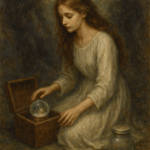Why is it often easier to give to people things that we should be giving ourselves first? You know – things like understanding, belief, trust, passion, forgiveness, love? The saying “you cannot give what you do not have” may well be a cliché already, and still, making ourselves have things that we need to have to be able to give away are rather difficult – often almost impossible. Almost to the point that we end up running out of whatever we have given away, even before we have made sure that we have had those that we have already given away.
And then, as I looked up at the starry sky, it made me think: maybe it is because we are designed out of love, by the God of limitless abundance and sheer love? God, in His limitless capabilities and power, created man out of dust, and breathed His own breath into man’s nostrils. Yes, that same God, who created everything in all forms and sizes, from the vast universe down to the smallest atoms, and from the humongous Blue Whale to the smallest bacteria, is the same God who created us men and women. And perhaps, despite our physical size, God may have put the most intricate design into man, allowing us to breathe His own breath, exist in His image and likeness, and perhaps, live with and in love.
Yes, love. The single, most romanticized aspect of life, and also the most important. Love has a lot of definitions, that it may well be different from each and every member of the current seven billion people existing on this planet right now. And yet, God, in all the mystery and glory that surrounds Him, has made love very concrete, for man to understand it clearly, as if it was so simple yet so profound. Love, God’s love, will always be abundant, true, and selfless.
God’s love surely is abundant. In fact, when He created everything, in the thousands of creatures that He created, he made man rule over the beasts of the earth, and even the plants. He provided everything that we might need. In fact, King David himself says that “the LORD is my Shepherd; I lack nothing (Psalm 23:1).” David, the Father of all Nations has emphasized how abundant God is in His provisions through a very simple yet profound statement.
God’s love surely is true. Else, why would God send His own Son right into the middle of the mess created by man, and then allow Him to be crucified by those who should have been in His place? God must be crazy, right? Yes, He might be. But as crazy as He is, that’s how true God’s immense love must be, too. God, in all His glory, does not need man or every other creation that He has created. And yet, despite all that, He has worked right in the middle of the mess – saving mankind and emphasizing how our longing for true love can only be fulfilled by Him. And all of those is not a show-off of Him; rather, it is God, who, in all His might and glory, chose to manifest the truest kind of love by humbling Himself before man who He created, and opening us up to the possibilities of endless love through relationships and selflessness.
And finally, it brings us to God’s selfless love. When creation failed to work the way He intended it to after man has chosen sin, God could have just wiped the whole slate clean, and created another paradise, and another set of male and female humans. But, no, He did not. He believed that it is way better to allow man to experience a radical kind of love that’s true, forgiving, and selfless, in order that love works its purpose – believing that the impossible could be possible with a force that binds, empowers, or perhaps, renews.
But if God’s love is true, abundant, and selfless, why is it that it’s hard for us men to comprehend and act upon His love?
Perhaps, it is because instead of us working in love as defined by God, we work on love after defining it ourselves. We romanticize love, to the point that its essence as God has intended for it to be has now been changed, reduced, or worse, eliminated.
To put it simply, we put the definition and bounds of love into our own hands. Sure – I’m guilty of this myself. I thought that by giving even I run empty, I will have manifested love. I gave everything I possibly could, and yet, still failed on it. Because I have failed to realize something – that I could never redefine love. That I can only follow the manual of love, as defined by its creator.
God was able to relate, to love, because relationship and love has already existed in Him. In fact, going as far back as the creation, God did not say “I will make…” Instead, He said “let’s make.” Sure – it’s confusing. Who could God be talking to? The Angels? The Cherubim? Maybe. But then again, even they are creations, too! So it must be that God is relating to someone else as He was saying that!
And yes, that’s where the beauty and mystery of the Holy Trinity comes in. One God, three persons – Father, Son, Holy Spirit. With the mystery of the Holy Trinity, God was able to have profound love that’s shared, selfless, and empowering.
And I guess, that’s where I failed. Because I never remembered my Creator when I thought I was loving with all I could. I was actually not. In fact, it’s more like I’m giving it wrong, working on a false definition defined by this world that’s now broken, bruised, because of the desire of man to be god themselves, and lord it over everything, even the most powerful force that’s supposedly binding us all, which is love.
Maybe, that’s also the reason why people would hurt another, would be so demanding, or perhaps, would cheat. Maybe, that’s the reason why there are lots of broken homes, broken families, broken relationships, and broken people – we’re trying to redefine the manual of love, without understanding the intention of the One who created it. We’re trying to create a new user manual for something that we did not create, and now the effects are damaging to us.
If only, we learned how to follow the manual. Or perhaps, listen to the Creator. Our Creator.












